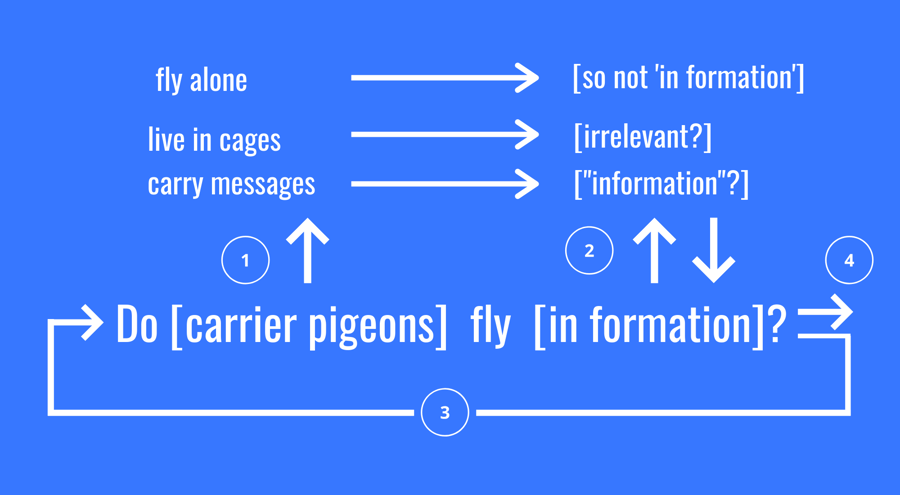
I used this example on LinkedIn to illustrate an issue we all face, and one that will lead us deeper into the conversation about digital cybernetic processes in business.
If we don’t have a ‘frame’ set around any piece of information, then we have to take it literally (i.e. surface meaning).
In the case above, if I set a frame of: “this is a comedic puzzle...”, you will approach it differently than if you are simply asked the question.
As a comedic puzzle you will consider the ‘parts in relation to the whole’ and wonder if there is ‘something’ hidden within it - this is what you’ve been trained to do when considering puzzles, or hearing many types of jokes (especially ‘puns’).
The frame set then sets a GOAL i.e. this is something you can ‘solve’, so you go seeking the answer.
In this case, the answer most people will find involves the similarity between the words ‘in formation’ and the word ‘information’.

"In this case, the answer most people will find involves the similarity between the words ‘in formation’ and the word ‘information’."
If you look at the way you process the information, it may look something like this:
You read the entire sentence, then
1. Consider the associations that come with 'Carrier Pigeons'
2. Look at the rest of the sentence and compare and contrast the associations
3. Re-process the sentence, and then
4. Think: "No! Carrier pigeons fly information." (or similar)
(and laughter in the aisles ensues as the comedic puzzle is solved…)
A GOAL then, is an essential component within the system for it to operate as it is intended - and without the goal (created by the frame, in this case), pigeons won’t be flying information, and probably won’t fly in formation either.
And in terms of business, you may well have your own GOALS, but unless the system can operate in a way that supports them through a series of feedback loops, you may find it hard to achieve them.
The good news is...we’re about to dive into a series of models that will change how you think about your business processes. Let’s start with looking at the role of the flywheel...
Note: credit to comedian and musician Tim Minchin, for getting me to think about 'in formation' as a pun.


I used this example on LinkedIn to illustrate an issue we all face, and one that will lead us deeper into the conversation about digital cybernetic processes in business.
If we don’t have a ‘frame’ set around any piece of information, then we have to take it literally (i.e. surface meaning).
In the case above, if I set a frame of: “this is a comedic puzzle...”, you will approach it differently than if you are simply asked the question.
As a comedic puzzle you will consider the ‘parts in relation to the whole’ and wonder if there is ‘something’ hidden within it - this is what you’ve been trained to do when considering puzzles, or hearing many types of jokes (especially ‘puns’).
The frame set then sets a GOAL i.e. this is something you can ‘solve’, so you go seeking the answer.
In this case, the answer most people will find involves the similarity between the words ‘in formation’ and the word ‘information’.

"In this case, the answer most people will find involves the similarity between the words ‘in formation’ and the word ‘information’."
If you look at the way you process the information, it may look something like this:
You read the entire sentence, then
1. Consider the associations that come with 'Carrier Pigeons'
2. Look at the rest of the sentence and compare and contrast the associations
3. Re-process the sentence, and then
4. Think: "No! Carrier pigeons fly information." (or similar)
(and laughter in the aisles ensues as the comedic puzzle is solved…)
A GOAL then, is an essential component within the system for it to operate as it is intended - and without the goal (created by the frame, in this case), pigeons won’t be flying information, and probably won’t fly in formation either.
And in terms of business, you may well have your own GOALS, but unless the system can operate in a way that supports them through a series of feedback loops, you may find it hard to achieve them.
The good news is...we’re about to dive into a series of models that will change how you think about your business processes. Let’s start with looking at the role of the flywheel...
Note: credit to comedian and musician Tim Minchin, for getting me to think about 'in formation' as a pun.

